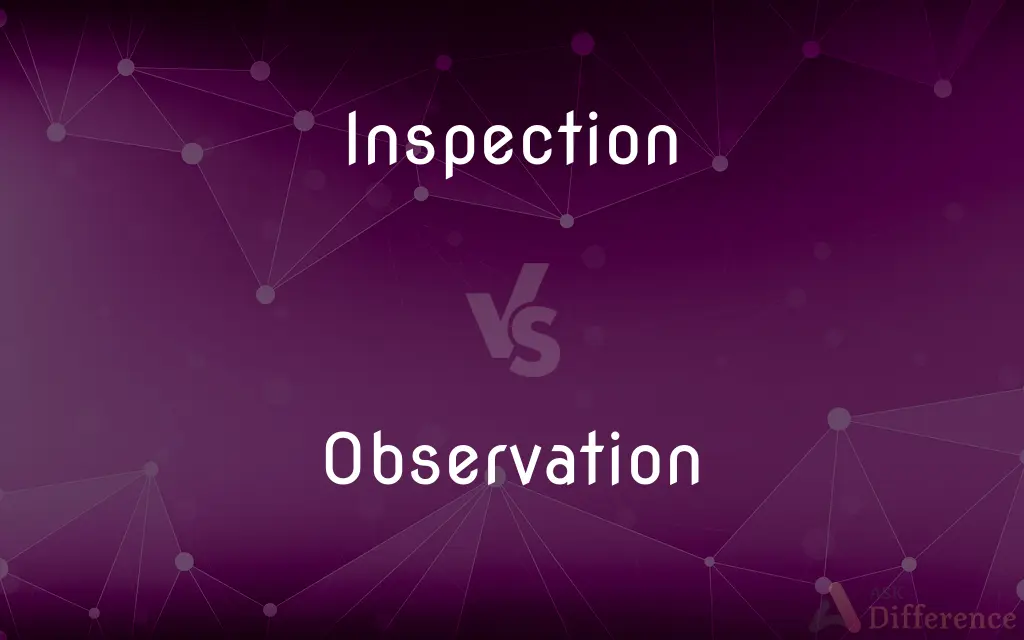Inspection vs. Observation — What's the Difference?
Edited by Tayyaba Rehman — By Urooj Arif — Updated on March 7, 2024
Inspection involves a detailed examination to assess compliance with standards, while observation is the act of watching something carefully to gain information.

Difference Between Inspection and Observation
Table of Contents
ADVERTISEMENT
Key Differences
Inspection is a formal process often carried out by a designated individual or team with the specific aim of ensuring that a product, service, or facility meets predetermined standards. It involves a thorough examination that can include measurements, tests, and checks against regulatory standards. In contrast, observation is a more general process of monitoring or noting something without the necessity for it to meet specific standards. Observation can be passive or active but is primarily focused on gathering data or information through careful watching.
While inspections are typically structured and follow a set protocol to ensure compliance, observations can be more flexible, allowing for the gathering of insights without the constraints of strict guidelines. For example, an inspector might check a restaurant for health code violations, using a checklist to ensure each standard is met. On the other hand, someone observing restaurant operations might simply watch the flow of service and customer interactions to understand the dining experience better.
Inspections often result in a formal evaluation or report stating whether the inspected entity meets the required standards. This can lead to actions such as passing an inspection, needing to make improvements, or failing. Observation, however, may not result in such formal outcomes but can lead to insights, conclusions, or informal feedback based on what was seen or noted.
The skill sets required for inspection and observation can differ. Inspections require knowledge of specific standards and criteria, as well as how to test for compliance. Observation skills might be more related to attention to detail, the ability to note subtleties, and an understanding of the context or environment being observed.
Both inspection and observation are valuable for different purposes. Inspections ensure safety, quality, and compliance, while observations can provide deeper insights into processes, behaviors, and experiences that may not be covered by standard inspections.
ADVERTISEMENT
Comparison Chart
Purpose
To assess compliance with standards
To gather information or data
Process
Formal and structured
Flexible and can be passive or active
Outcome
Formal evaluation or report
Insights, conclusions, or informal feedback
Skill Required
Knowledge of standards and testing for compliance
Attention to detail, noting subtleties
Examples
Checking a building for fire safety compliance
Watching customer reactions in a store
Compare with Definitions
Inspection
Aimed at ensuring standards are met.
A health inspection ensures restaurants adhere to hygiene standards.
Observation
Does not necessarily follow a checklist.
Observation of wildlife in their natural habitat requires patience and attention.
Inspection
Conducted by designated inspectors.
The electrical system inspection was conducted by a certified electrician.
Observation
Watching or monitoring to gather information.
Through observation, the teacher noted how students interacted.
Inspection
A formal examination to verify compliance.
The factory undergoes a safety inspection each year.
Observation
Requires attention to detail and context understanding.
Observation of the market trends is crucial for successful investment decisions.
Inspection
Results in a compliance report.
The building passed the inspection with minor recommendations for improvement.
Observation
Can be passive or active.
The researcher's passive observation involved noting behaviors without interaction.
Inspection
Involves measurements, tests, and checks.
The inspection revealed that the equipment was outdated.
Observation
Focuses on gaining insights.
The manager's observation of employee productivity identified several inefficiencies.
Inspection
An inspection is, most generally, an organized examination or formal evaluation exercise. In engineering activities inspection involves the measurements, tests, and gauges applied to certain characteristics in regard to an object or activity.
Observation
Observation is the active acquisition of information from a primary source. In living beings, observation employs the senses.
Inspection
The act of inspecting.
Observation
The act of observing
Observations of a rare bird.
Inspection
Official examination or review, as of barracks or troops.
Observation
The power or faculty of observing.
Inspection
The act of examining something, often closely.
Upon closer inspection, the animal turned out to be a dolphin, not a shark!
Observation
The fact of being observed
Kept the suspect under observation.
Inspection
An organization that checks that certain laws or rules are obeyed.
The inspection fined the restaurant's owner because the kitchen was dirty.
Observation
The act or process of perceiving something, such as a phenomenon, often by means of an instrument, and making a record of the resulting information.
Inspection
The act or process of inspecting or looking at carefully; a strict or prying examination; close or careful scrutiny; investigation.
With narrow search, and with inspection deep,Considered every creature.
Observation
The result or record of such an act or process
A meteorological observation.
Inspection
The act of overseeing; official examination or superintendence.
Observation
An inference, judgment, or remark that is made by observing
Made some sharp observations about the movie.
Inspection
A formal or official examination;
The platoon stood ready for review
We had to wait for the inspection before we could use the elevator
Observation
The act of observing, and the fact of being observed (see observance)
Observation
The act of noting and recording some event; or the record of such noting.
Observation
A remark or comment.
Observation
A judgement based on observing.
Observation
Performance of what is prescribed; adherence in practice; observance.
Observation
A regime under which a subject is routinely observed.
Observation
Philosophically as: the phenomenal presence of human being existence.
Observation
(stochastics) A realization of a random variable.
Observation
The act or the faculty of observing or taking notice; the act of seeing, or of fixing the mind upon, anything.
My observation, which very seldom lies.
Observation
The result of an act, or of acts, of observing; view; reflection; conclusion; judgment.
In matters of human prudence, we shall find the greatest advantage in making wise observations on our conduct.
Observation
An expression of an opinion or judgment upon what one has observed; a remark.
To observations which ourselves we makeWe grow more partial for the observer's sake.
Observation
Performance of what is prescribed; adherence in practice; observance.
We are to procure dispensation or leave to omit the observation of it in such circumstances.
Observation
The act of recognizing and noting some fact or occurrence in nature, as an aurora, a corona, or the structure of an animal.
Observation
The act of making and recording a measurement
Observation
The act of observing; taking a patient look
Observation
Facts learned by observing;
He reported his observations to the mayor
Observation
The act of noticing or paying attention;
He escaped the notice of the police
Observation
A remark expressing careful consideration
Common Curiosities
Why is observation important in research?
Observation is crucial in research as it allows for the collection of data and insights that might not be evident through other methods, helping to form a comprehensive understanding of a subject.
What is the main difference between inspection and observation?
The main difference lies in the purpose and process: inspection is a formal examination to assess compliance with standards, while observation is about watching something to gather information.
Can observation lead to formal outcomes?
While observation typically leads to insights or informal feedback, it can influence formal outcomes like changes in policies or practices based on the observations made.
Is an inspector also an observer?
An inspector can be an observer as part of the inspection process, but the role also requires specific knowledge and authority to assess compliance with standards.
Can observation be considered a type of informal inspection?
While observation can informally assess situations or behaviors, it lacks the formal authority and framework of an inspection aimed at compliance assessment.
How do skills required for inspection differ from those for observation?
Inspection skills are more about understanding and applying specific standards and protocols, whereas observation skills focus on noticing details and understanding context.
How do the outcomes of inspections and observations differ?
Inspections result in formal evaluations or compliance reports, while observations lead to insights, conclusions, or informal feedback without a formal assessment framework.
Can the findings from observations lead to the need for an inspection?
Yes, observations that indicate potential non-compliance or issues might prompt a formal inspection to assess and address the situation.
How do inspections impact businesses?
Inspections can significantly impact businesses by ensuring that they meet required safety, quality, and operational standards, potentially affecting their reputation and operational status.
Is technology used in both inspection and observation?
Yes, technology can enhance both processes, through tools for conducting precise inspections or devices for recording and analyzing observations.
How does the environment impact inspection and observation?
The environment can significantly affect both, as it sets the context in which standards are applied or where behaviors and processes are observed.
Are inspections mandatory?
Many types of inspections are mandatory, especially those related to safety, health, and environmental compliance, and are regulated by law or industry standards.
How does one become qualified to conduct inspections?
Becoming qualified typically requires specific training and certification relevant to the type of inspection being conducted, which varies by industry and regulatory standards.
What role does public perception play in inspection and observation?
Public perception can be important, as trust in the processes and their outcomes can affect confidence in safety, quality, and standards being upheld or in the validity of the insights gained.
Can anyone perform an observation?
Yes, anyone can perform an observation, but effective observation for professional or research purposes often requires specific skills and knowledge.
Share Your Discovery

Previous Comparison
Velvet vs. Velveteen
Next Comparison
Lentivirus vs. RetrovirusAuthor Spotlight
Written by
Urooj ArifUrooj is a skilled content writer at Ask Difference, known for her exceptional ability to simplify complex topics into engaging and informative content. With a passion for research and a flair for clear, concise writing, she consistently delivers articles that resonate with our diverse audience.
Edited by
Tayyaba RehmanTayyaba Rehman is a distinguished writer, currently serving as a primary contributor to askdifference.com. As a researcher in semantics and etymology, Tayyaba's passion for the complexity of languages and their distinctions has found a perfect home on the platform. Tayyaba delves into the intricacies of language, distinguishing between commonly confused words and phrases, thereby providing clarity for readers worldwide.
















































